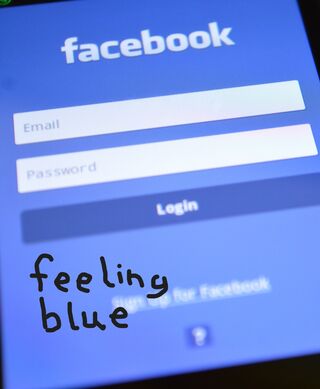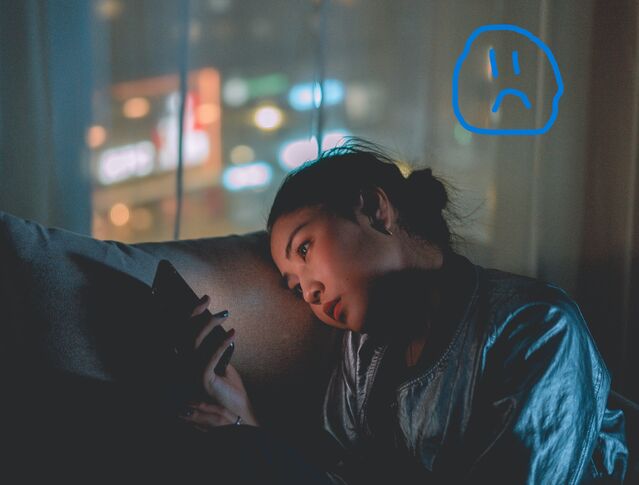Social Networking
Facebook Caused Poor Mental Health From the Beginning
New research explores mental health in facebook's early days.
Posted October 23, 2022 Reviewed by Abigail Fagan
Key points
- New research examines whether Facebook caused mental health problems in college students from 2004 to 2006.
- The study found that when Facebook added a college campus to its early service, depression and anxiety increased among students.
- Declines in mental health were worst among those who were already the most vulnerable.
- This effect is likely due to social comparison, not bad actors, advertisements, or politics on social media.

There is an epidemic of mental health problems in the U.S., and social science research is increasingly finding a connection between social media and poor mental health. This has been documented in correlational studies–which examine when two things are related, without being able to show one definitely causes the other. It has also been seen in experiments, which do allow us to establish cause and effect. For example, people who were randomly assigned to give up social media reported feeling less depression and anxiety after a week, compared to those randomly assigned to keep using social media as normal.
A prominent argument on this issue is that a change in the feed—what users see when they log in to Facebook (and similar social media sites)—led social media to be particularly harmful to mental health. Yet new research using an innovative design to test whether Facebook caused mental health problems contradicts this story. Facebook has been causing poorer mental health in college students since it was first rolled out among a small group of elite colleges and universities. The study also provides some evidence for why Facebook might be causing mental health problems.
First, the design: This study looked at 2004 to 2006, the period when Facebook expanded from just being available to Harvard students to then being rolled out at an increasing number of colleges and universities. National surveys were being collected on the mental health of college students throughout this time, which could be connected to the dates at which Facebook was introduced on each campus. This allowed the researchers to use a new tool for establishing cause-and-effect: a difference-in-differences analysis.
The analysis looks at levels of mental health problems before Facebook was introduced, and then compares it to the levels afterwards. This allows for statistical adjustments to be made that account for baseline mental health at that college and any trends that might have been going on before Facebook was introduced. The fact that there are 58 different schools, each gaining access to Facebook at different times, means that this comparison can be made over and over. The results therefore reflect the pattern seen as Facebook was introduced at each new school. While this study didn’t include an experiment (the gold standard for establishing cause-and-effect), it was able to use advanced statistical techniques to check their assumptions about a cause-effect relationship.

The key findings, which were confirmed after checking multiple assumptions, are that after Facebook was introduced to a campus, more students on that campus reported having depression and anxiety disorders. In particular, they were more likely to say they felt hopeless, exhausted, and “severely depressed.” When Facebook was introduced to a campus, more students were also reporting that mental health problems affected their academics. Further, the effect was strongest among students who were already most susceptible to mental illness. In other words, Facebook made college students already predisposed to depression or anxiety more likely to actually experience poor mental health.
Prior discussions of Facebook emphasized the way the platform evolved over time. ‘It started out simple, with friends sharing photos and details of their lives,’ the popular narrative goes. ‘Only later did the ability to gain a large audience from a post drive people to change their behavior to be better picked up by the algorithm.’ The modern experience of Facebook—with direct marketing, personal brand building, and political flamethrowing—is the problem, and it’s something that emerged after people learned how to ‘game the algorithm’ of the social media site. For example, psychologist Jonathan Haidt suggests that Facebook began to cause more problems after three changes to the site: the introduction of the feed–a constantly updating timeline of posts—in 2006, the addition of the “Like” button in 2009, and later the use of internal algorithms to show content that was predicted to drive engagement. The new research shows that this isn’t true: Facebook was causing poorer mental health from the start, before these innovations were rolled out.
If Facebook had a negative effect on college students’ mental health from the beginning, this suggests that it’s not just trolls, propagandists, and a new breed of bad or cynical actors on the site that caused it. It’s something that’s been baked in from the beginning. The authors of the new research paper suggest that this deeper culprit is something much older and more common in our culture: social comparison.

To support this idea, the new study does analyses of several groups of students who would be expected to compare themselves negatively to others at their college or university. For example, they found that Facebook led to even large declines in mental health for students who lived off campus. These students might believe that they weren’t experiencing as much of the “full college experience” as students living on campus. Several other related categories were examined, including not being in a fraternity or sorority; having to work on top of going to school; being overweight; and having credit card debt. In each case, being in the category that does not match the “idealized” version of a college experience was related to having worse mental health—but not always at a statistically significant level.
Social media allows you to see large amounts of your peers’ lives in intimate detail, which can magnify opportunities for comparing your own life to theirs. With so many more people to compare yourself to, and so much more of your time spent looking at these comparisons, college students may have naturally started to find themselves lacking. It would be nice to believe that just by clearing out bots and advertisements, we could make Facebook a healthy source of connection. But it may be the core feature of social media itself—the ability to share private moments of daily life with friends and peers—that actually causes harm.
References
Braghieri, Luca and Levy, Roee and Makarin, Alexey, Social Media and Mental Health (July 28, 2022). Available at SSRN: https://ssrn.com/abstract=3919760 or http://dx.doi.org/10.2139/ssrn.3919760


